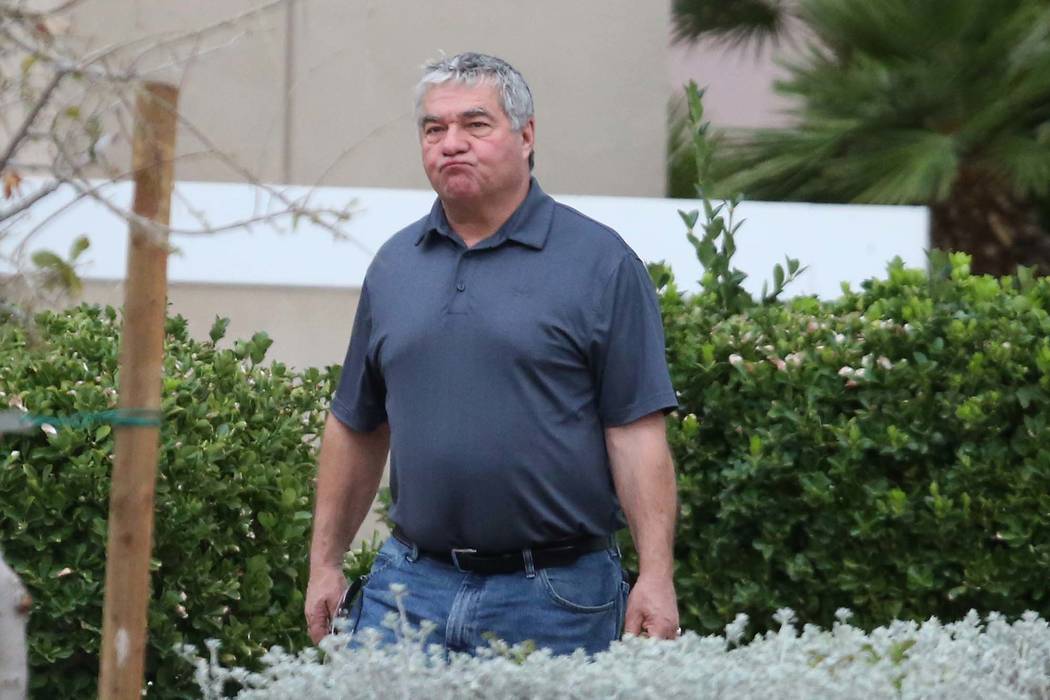Could ex-Henderson constable’s conviction taint Burning Man cases?
Former Henderson Constable Earl Mitchell’s failure to disclose his corruption conviction may have “tainted” criminal cases he worked on during this year’s Burning Man festival, the county sheriff told the Review-Journal.
Pershing County Sheriff Jerry Allen said he only found out about Mitchell’s guilty plea to a gross misdemeanor — charges sparked by a Review-Journal investigation — after the event, which ended Sept 2.
“I’m highly upset I didn’t find out until the end of the festival,” he said in a phone interview. “Now, everything he touched is tainted.”
Mitchell was paid $6,527.50 in August and September to work as a police officer in Black Rock City, and he supervised two felonies — a sex assault and a battery on police officer, according to Pershing County District Attorney R. Bryce Shields. Shields said he still plans to purse Mitchell’s cases because there are other officers involved in many of the arrests and police often shoot body camera video.
Mitchell, who has a series of financial problems, including a $165,000 IRS lien filed at the county recorder’s office, has been working Burning Man since 2016. He has made more than $20,000 for the work, records show.
Mitchell may keep police powers
Mitchell, 62, pleaded guilty in July to gross misdemeanor fraudulent conveyance as part of a plea to settle the five-count felony indictment stemming from Mitchell’s spending of constable funds. Mitchell also repaid the county more than $80,000, records show.
Mitchell’s attorney Marc Risman said he is still researching whether the gross misdemeanor guilty plea, where the defendant doesn’t admit guilt, would allow defense attorneys to impeach him as a witness in the criminal cases.
“I think he needs to work it out with sheriff of Pershing County, but I don’t know if there was any affirmative duty for him to mention that he had a gross misdemeanor,” Risman said in a phone interview.
Risman is representing Mitchell in an attempt to retain his Peace Officer Standards and Training (POST) certification that allows him to work in law enforcement.
A hearing to determine revocation of Mitchell’s POST certification had been scheduled for Nov. 4, but Risman rescheduled it due to a conflict.
He said POST officials have discretion whether to revoke a law enforcement certification after a gross misdemeanor conviction, but if Mitchell had pleaded guilty to a felony, the agency would have had to revoke his police powers.
Clark County District Attorney Steve Wolfson initially refused to settle for anything less than a felony, emails show, but eventually agreed to the lesser charges when Mitchell paid the county back.
Prosecutors has other evidence
Shields said Mitchell is a Brady officer, referring to the 1963 U.S. Supreme Court Brady v. Maryland ruling requiring prosecutors to provide information to defense attorneys that might help the defendant, including flagging dishonest police officers.
“If a law enforcement officer is convicted of a crime, especially regarding their honesty, and the fact he didn’t reveal that — if we had gone forward and failed to disclose it” it would have been a problem, he said.
Shields could not immediately provide the number of misdemeanor cases Mitchell worked on during this year’s festival.
Sheriff Allen said he only became aware of Mitchell’s indictment and conviction after some Ely police officers told him about it. Allen said he checked Mitchell’s POST certification before the festival and it was valid.
POST executive director Michael Sherlock said they were not informed of any police employment by Mitchell since he abandoned his 2018 re-election bid for constable in the wake of the Review-Journal story.
The story found that Mitchell had inflated billings for deputies and withdrew the money in casinos and video poker bars. He also used the money for expensive meals and to travel to places near where his adult children live, bank statements showed.
Contact Arthur Kane at akane@reviewjournal.com. Follow @ArthurMKane on Twitter. Kane is a member of the Review-Journal’s investigative team, focusing on reporting that holds leaders and agencies accountable and exposes wrongdoing. Support our journalism.



























